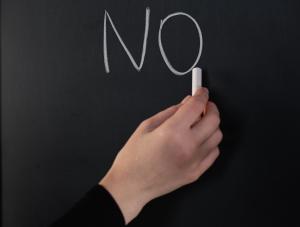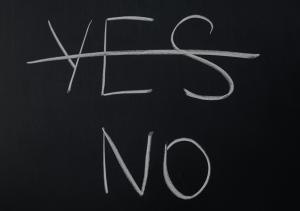Power of Saying No: Examples to Empower and Feel Confident
Saying “no” can sometimes be challenging, but it’s important to recognize that it’s a crucial skill for maintaining healthy boundaries and prioritizing your well-being. In this article, we’ll explore the significance of saying no, different ways to do so, how to feel empowered when saying no, and the challenges that may arise in doing so.
If after reading this article you still need guidance you can check out life coaching.
Why is it Important to Say No?
Even I, today, right now have trouble saying no. This is an ongoing battle for most people.
Understanding the Impact of Saying Yes to Everything
 Constantly saying “yes” to every request or demand can have a
significant impact on your mental and emotional well-being. It may lead
to overwhelm, burnout, and feelings of resentment. Learning to say no
can help you build healthy boundaries and protect your time and energy.
Constantly saying “yes” to every request or demand can have a
significant impact on your mental and emotional well-being. It may lead
to overwhelm, burnout, and feelings of resentment. Learning to say no
can help you build healthy boundaries and protect your time and energy.
How Setting Boundaries Can Improve Your Overall Mental Health
Establishing healthy boundaries is crucial for maintaining your mental health. When you learn to say no, you gain the ability to prioritize your needs and allocate time for self-care, ultimately leading to a more balanced and fulfilling life.
In retrospect, I realized the importance of setting boundaries, and here are some ways how doing so can improve your overall mental health:
-
Preserves Energy: When we say no to tasks we don’t enjoy or have time for, we conserve energy for the activities we value most. The result? Increased productivity and creativity.
-
Enhances Independence: Saying no allows you to trust yourself to make decisions regarding your own time and limits.
-
Reduces Stress: Setting boundaries can reduce feelings of overwhelm and anxiety, leading to an overall healthier lifestyle. You can also read more about stress management here.
-
Improves Self-Esteem: Declining politely gives a sense of self-empowerment, leading to improved self-esteem and self-understanding.
-
Fosters Balance: By balancing commitments and personal time, boundaries can lead to a healthier work-life balance.
Adapting to this approach of setting boundaries and learning to say “no” hasn’t been an easy path. However, with time, patience, and practice, I’ve managed to build a healthier mental state, achieving more balance and fulfillment in my life.
The Role of Saying No in Building Healthy Relationships
 Saying no plays a vital role in fostering healthy relationships. It
allows you to communicate your needs and limits clearly, promoting
mutual respect and understanding within your interactions.
Saying no plays a vital role in fostering healthy relationships. It
allows you to communicate your needs and limits clearly, promoting
mutual respect and understanding within your interactions.
Example 1: Personal Relationships
“I used to always put others’ needs before mine in my personal relationships”, confesses Rachel, a 29-year-old psychologist. “I would agree to plans I didn’t want to be a part of, extend help I didn’t have time for, just to avoid the discomfort of saying no. Eventually, I realized this was causing resentment and exhaustion. When I started saying no to things that didn’t align with my values, needs, or schedule, it surprisingly made my relationships healthier. People started understanding and respecting my needs and boundaries”.
Example 2: Workplace Boundaries
Tom, a senior software developer in a reputed firm, shares his experience: “In my initial days, I never said no to any task given to me, even if it overrode my workload or personal time. I didn’t want to be seen as unproductive or uncooperative. But the cost I was paying was burnout and resentment. When I started setting boundaries by refusing extra work beyond my capacity or working hours, I feared backlash. But to my surprise, it lead to an increased understanding from my superiors and colleagues. They not only understood my limits but also started respecting them”.
Example 3: Parenting
“Mum, can I have some ice cream before dinner?”, “Dad, can I skip my homework today?”. This is a regular drill for Emily, a mother of two. “As parents, we often face the dilemma of saying no to our children. It can make them upset, and that’s the last thing we want as parents. But sugar-coating everything isn’t good for them. So, I decided to say no when it’s necessary for their benefit, like skipping meals or homework. It initially led to some tantrums, but gradually they started understanding the rationale behind my decisions. It taught them the concept of limits, discipline, and also ignited problem-solving and decision-making skills in them.”
Saying “no” is an invaluable tool that fosters healthy relationships. When used appropriately, it not only communicates your needs and boundaries but also sets the tone of mutual respect and understanding.
What Are Different Ways to Say No?
Exploring Techniques for Politely Declining Without Offending
 There are various techniques for politely declining requests or
invitations without causing offense. Expressing gratitude, providing a
brief explanation, and offering alternative solutions are effective ways
to say no while maintaining positive communication.
There are various techniques for politely declining requests or
invitations without causing offense. Expressing gratitude, providing a
brief explanation, and offering alternative solutions are effective ways
to say no while maintaining positive communication.
Here’s a table that includes some techniques for saying “No” without offending:
| Technique | Explanation | Example |
|---|---|---|
| Expressing gratitude | Acknowledge the person’s request | “Thank you for providing me with this opportunity… |
| Provide an explanation | Give a brief reason for your inability to meet the request | …“However, I have some prior commitments that I need to prioritize at this point.” |
| Offer alternative | If possible, suggest another way in which your requestor can get their need met | “You may want to check with Tim. I’m sure he’d be able to help you out.” |
| Reiteration | Restate your gratitude and wish them success | “Thanks again for considering me for this. Good luck finding the right fit.” |
| Just Plain No | You just simple say “No.” if they don’t go for any of the above | “No. Sorry. Can’t” |
These steps might help in turning down a professional request while still preserving the relationship.
Learning How to Prioritize and Take Time for Yourself
 Learning to prioritize your commitments and take time for yourself is
essential for developing the ability to say no when necessary. It allows
you to assess the demands on your time and energy, empowering you to
make informed decisions about when to decline certain requests.
Learning to prioritize your commitments and take time for yourself is
essential for developing the ability to say no when necessary. It allows
you to assess the demands on your time and energy, empowering you to
make informed decisions about when to decline certain requests.
Here are some actionable steps you can use to take more time for yourself:
Actionable Step 1: Use a Planner
How to do it: Rediscover the age-old habit of using a planner, either digitally or traditionally. Write down each task, appointment, or commitment you have. Make sure to include your personal time, such as downtime, hobbies, family time.
Result: After a while, you will start to get a visible understanding of how crowded or sparse your schedule is. This will enable you to realistically assess if you can make time for additional tasks. Hence, you can confidently decline offers when your schedule shows no room for maneuver.
Actionable Step 2: Prioritize Tasks
How to do it: The Eisenhower Box or Matrix, a time management tool credited to Dwight D. Eisenhower, 34th US President, can help here. Divide tasks into four categories based on their urgency and importance. Urgent and important tasks, you do immediately. Important but not urgent ones, you schedule for later. Urgent but not important tasks, you can delegate, and tasks that are neither important nor urgent, you can disregard.
Result: Accessing this gives you the clarity of when to say a “Yes” and when a “No” is more appropriate. It will aid you in focusing on your priorities and help separate the wheat from the chaff in your life.
Actionable Step 3: Make Time for Self-Care
How to do it: Intentionally schedule in ‘me-time’. It is non-negotiable. You could devote this time to anything that replenishes you or brings you joy - reading a book, meditating, doing yoga, indulging in a hobby, etc.
Result: Regularly setting aside time for self-care will allow you to relax and rejuvenate your mind. Consequently, you’ll be better equipped to handle demands on your time with clarity and peace of mind. When you are rested and not running on empty, you are better able to assess your capacity for additional tasks and make more informed decisions on when to say ‘No’. Mindfulness is very important and is talked more about here.
The practice of prioritizing and taking time for yourself can feel foreign or even uncomfortable if you’re used to running on a packed schedule. Remember, your mental wellbeing and self-care are key to your overall health and productivity. By implementing these strategies and learning to occasionally say ‘No’, you will be better able to wield control over your life’s schedule, rather than your schedule controlling you.
Effect on Your Socially Acceptable Behavior When Saying No
 Saying no can redefine socially acceptable behavior by promoting healthy
boundaries and self-respect. It demonstrates that it’s okay to
prioritize your well-being and stand by your decisions without feeling
the need to constantly please others.
Saying no can redefine socially acceptable behavior by promoting healthy
boundaries and self-respect. It demonstrates that it’s okay to
prioritize your well-being and stand by your decisions without feeling
the need to constantly please others.
Here are some potential reactions, self-protection strategies and how to stay strong during the whole thing.
| Potential Reaction | Self-Protection Strategy | Staying Strong |
|---|---|---|
| Surprise/Shock | People close to you, perhaps used to hearing ‘Yes’ all the time, may react with surprise or shock. | Reiterate that your decision isn’t personal, you are just prioritizing your needs at the moment. |
| Guilt-Tripping | Some may resort to guilt-tripping when their request is declined. | Firmly but kindly advocate for your decisions while expressing sensitivity to their feelings. |
| Insistence/Persistence | Some people may persistently cajole or pressure you into saying ‘Yes’. | With the utmost politeness, yet again assert that you will not be able to fulfill their request. |
| Appreciation/Respect | Over time, people will start to appreciate and respect your boundaries. | Express gratitude for their understanding and patience. |
Changing how you interact with others is often met with resistance and potentially negative reactions. However, saying ’no’ is a crucial part of self-care and should not be reserved only for when you are at your limit. With patience and practice, it will become easier, and most importantly, it will lead to healthier relationships with others and yourself.
How to Feel Empowered When Saying No

Examples of Assertive Communication to Feel Confident
Assertive communication is key to feeling empowered when saying no. By expressing your thoughts and feelings clearly and respectfully, you can build confidence in your ability to assert your needs and make decisions that align with your well-being.
Building the Ability to Say No and the Positive Outcome
Developing the ability to say no can lead to positive outcomes in various aspects of your life. It allows you to prioritize your goals, prevent overcommitment, and foster genuine connections based on mutual understanding and respect.
Discovering the Nature of Saying No and Its Impact on Your Mental Health
Understanding the nature of saying no and its impact on your mental health is crucial for feeling empowered in your decisions. It enables you to acknowledge that prioritizing your well-being through assertive communication is a healthy and necessary practice.
Challenges of Saying No
When Saying No May Find You in a Difficult Situation
Saying no may sometimes place you in challenging situations, especially when faced with pressure or expectations from others. It requires the ability to navigate such scenarios with resilience and confidence in your decisions.
Behavioral Shifts That Might Help You Say No When Needed
Making behavioral shifts can assist you in confidently saying no when necessary. Cultivating self-awareness, practicing self-compassion, and seeking support from trusted individuals can strengthen your ability to assert your needs and boundaries.
Knowing When You Need a Break and How to Communicate It Effectively
 Recognizing when you need a break and effectively communicating it is
essential for maintaining your well-being. Learning to assertively
express your need for rest and rejuvenation can help you navigate
difficult situations and prioritize self-care.
Recognizing when you need a break and effectively communicating it is
essential for maintaining your well-being. Learning to assertively
express your need for rest and rejuvenation can help you navigate
difficult situations and prioritize self-care.
On a typical Tuesday, coding for a client with my phone buzzing relentlessly, I found myself faced with a tough decision. It was my friend, Tim, enthusiastic but overcommitted university event organizer, reaching out for help—again. For the 8th time.
COME ON TIM?!
All too familiar was this situation, him BEGGING for assistance, me, balancing the weight of my work against the guilt of letting a friend down. You know? Tuesday. It was like standing at a junction where both paths were fraught with anxiety and my own health and well-being hung in the balance.
Normally, I’d take the well-trodden path, stepping into the shoes of a ‘yes’ person, lost in the routine. But the stress, relentless deadlines and the feeling of constant burnout were too tangible to ignore this time. So I took a breath, and for the first time, managed to say: “No, Tim. Sorry, but I just can’t right now.” It was a single decision, but it was my first step towards empowerment through declining. Now, let’s dive into how this word ‘No’ and its power transformed my perspective…
Let me tell you a story about a word we’re all too familiar with but struggle to use– “No.” And how learning the Power of saying “No” has empowered me and can empower YOU into achieving a healthier mental health.
I used to be a “Yes” person. You know, the kind who never says no to any request, feeling that refusal would hurt others’ feelings. Whether it’s helping a friend with a request, attending yet another event, or picking up the slack at work- I kept saying “Yes” even when I didn’t want to, and before I knew it, my time and energy were all depleted. This behavior originated out of fear - fear of disappointing others and fear of being rejected.
Empowerment through saying no gracefully became my mantra.
After that first “No,” I took it as a mission to empower myself through saying no gracefully, a mantra that stood its course. But I must confess, it wasn’t an overnight change. I needed certain techniques and a little mental nudge now and then. Let me share some of the ways I mastered the art of saying no, ways that may also be beneficial for you.
-
Realizing the need to say ‘No’: The first step is understanding that it’s natural to say ‘No’. The need arises when you’re overwhelmed, when there’s just not enough time, or when it’s simply something you don’t enjoy doing.
-
Communicating the ‘No’: It’s all about striking a balance - expressing your decline without negative implications. A phrase I often use is: “I appreciate your request. I must prioritize other tasks right now. Let me come back to it later if you still need help.”
-
Dealing with the discomfort: The truth is, it was hard to say no. It brought along a certain discomfort. But in retrospect, the temporary discomfort was easier to handle than the stretch of burnout.
-
Taking time: You don’t always have to answer right away. When in doubt, remember it’s okay to say, “I need to check my schedule; I’ll get back to you.” This provides you the time you need to consider the pros and cons and make a decision that is in your best interest.
-
Staying firm: People tend to push back when you say no. Keep in mind that your time is valuable, and you have every right to decline something that doesn’t serve your well-being or growth. Stick to your decision and feel the empowerment through asserting your boundaries.
As you navigate through these steps, remember - your personal growth and mental health are paramount. In the complicated tapestry of life, especially in the pandemic era where boundaries between personal and professional spaces have blurred, saying ’no’ might be exactly what you need.
Consider this - an interest in all kinds of service doesn’t mean you must serve all. Empowerment through polite refusal allows you to pick your battles. When you harness this power, it facilitates better self-understanding and self-respect, which is a crucial piece in the jigsaw of mental health.
Remember, it’s okay to seek help if you need it. I did. My journey towards saying no gracefully involved inputs from a mental health professional - their expert guidance was more helpful than I could express. So, if you find yourself at a crossroads and unsure how to proceed, don’t hesitate to reach out to a professional.
In the end, this whole excursion into the power of declination has led me to one golden rule: Each time I consider taking up a task, I ask myself - “Will this tire me or fuel me?” If it’s the former, ’no’ becomes the natural, empowered choice to make.
Let’s start to view declining not as a negative response, but as an assertion of respect towards our mental health, well-being, and personal growth. And remember, the art of saying ’no’ gets easier with time, practice, and an inner understanding that it’s okay to prioritize YOU.
Self-Respect & Self-Understanding
To empower personal growth, I learned to value my needs as an integral individual. The key to stating “No” was understanding that my needs were crucial, and prioritizing them over others’ unnecessary demands was not selfish but self-respectful. Setting boundaries became my ammo to protect my mental health.
How to harness the power of saying no: A hard lesson learnt
Think back to when you feel overwhelmed or anxious, doesn’t it mostly result from having too many obligations? In my quest to please everyone, I forgot to consider a crucial factor – my mental health. I had to stop, reevaluate and reclaim my power by learning different ways to say no, a decision that significantly changed my life.
Remember, saying no is all about setting boundaries and knowing your limits. If you’re ever in a situation where you feel uncomfortable or over-committed, learn to prioritize your mental health and let yourself off the hook. It doesn’t make you selfish or irresponsive, but smart!
Saying no for self-respect and empowerment is not rejecting others, but accepting YOU.
Being okay with declining requests enabled me to approach my relationships and commitments with more respect and purpose. For instance, it taught me to decentralize myself in a helping role and allow others to step up and grow.
After all, it’s only through the balance of giving and receiving that true happiness and well-being thrive.
Your Mental Health Matters
The risk of not saying no is evident in the toll it takes on your overall mental health. The act of saying no is a vital behavior that prevents exhaustion and preserves your self-esteem. Saying no can feel like a big step but remember, our mindset around saying no needs to shift. From feeling an obligation towards others to investing in our own well-being, saying no is transformative.
Isn’t it odd that we’re more considerate about the feelings of others, often at the expense of our own? If you’ve ever felt guilty after declining something, you’re not alone. Let’s banish that guilt and start making saying no for self-empowerment a social norm.
Takeaway: When we say No to things we don’t need, we say Yes to ourselves - Feel the power of saying no!
Saying no without guilt for self-empowerment is fundamental. It’s okay to say “no” without offering elaborate explanations or feeling guilty. After all, you’re not rejecting the person, you’re only declining a request. The benefits of declining gracefully actually empower personal growth by giving us the time and energy to pursue goals that truly matter to us.
Before I wrap, let me share a funky note: When your requests are declined, don’t take it personally! Consider it a sign of mutual respect and understanding. When someone prioritizes their own needs over your request, it’s not a personal attack, but an act of self-care from their end.
In a world that pressures us into doing more, becoming more, and constantly achieving, saying no can sometimes be the most empowering decision we make towards a healthier, more balanced mental state. A step towards a true respect for self-understanding, and a testament to one’s strength.
So, to you reading this post, I hope you remember the next time you feel overwhelmed with requests, that it’s okay to decline, it’s okay to say no. It’s okay to prioritize YOURSELF, because unless you care for yourself, you can’t genuinely care for others.
Oh, and don’t forget to drop a comment! Have you declined an offer recently? How did that feel? Have you discovered the empowering aspects of saying no? Always remember: saying no is so important, and you are important. Until next time, keep saying no confidently!